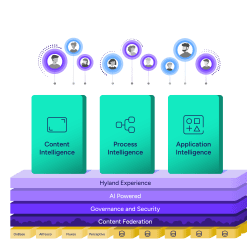Becker Mining Systems
Becker Mining replaces manual processes, benefits from greater collaboration.

Harness the power of a unified content, process and application intelligence platform to unlock the value of enterprise content.
Learn more
Explore Hyland’s solutions by industry, department or the service you need.
Overview of solutionsIt's your unique digital evolution … but you don't have to face it alone. We understand the landscape of your industry and the unique needs of the people you serve.
 Overview of industries
Overview of industries
Countless teams and departments have transformed the way they work in accounting, HR, legal and more with Hyland solutions.
 Overview of departments
Overview of departments
We are committed to helping you maximize your technology investment so you can best serve your customers.
 Overview of services
Overview of services

Discover why Hyland is trusted by thousands of organizations worldwide.
Hear from our customers
Our exclusive partner programs combine our strengths with yours to create better experiences through content services.
Overview of partners
Find resources to power your organization's digital transformation.
Browse the resource center
Hyland connects your content and systems so you can forge stronger connections with the people who matter most.
Learn about HylandWith our modern, open and cloud-native platforms, you can build strong connections and keep evolving.
 Dig deeper
Dig deeper
Reading time minutes
Becker Mining replaces manual processes, benefits from greater collaboration.

When your business relies on project management and team collaboration spread across many locations, the way you handle information is pivotal. Files must be accessible to multiple people at any time. You need the ability to edit and add documents in a way that preserves the integrity of the content. When important information comes into the organisation in an unstructured form – perhaps in an email – it must be acknowledged, shared with team members and filed alongside any related material. The failure to keep everyone on the team informed can give rise to serious consequences.
It’s a problem that Becker Mining Australia understands all too well. The company works with mining and industry clients to provide engineering, mechanical, electrical and labour hire solutions. Its offices are located in Kalgoorlie, Townsville, Perth, Moss Vale, Unanderra and Newcastle.
Demand in the company’s scope of work has given rise to a number of challenges. Where once project teams tended to be drawn from a single office, staff now find themselves frequently working with colleagues across the country.
"Now there is much more collaboration on any given project,” explains George Buckley, Chief Financial Officer at Becker Mining Systems. “For example, we may have a project running at Moss Vale that calls for heavy involvement of some Newcastle staff. Therefore, there must be excellent information flow between Newcastle and Moss Vale.”
Buckley noticed issues were beginning to emerge due to gaps in communication between project teams. “We found people were getting information by email at one site, but it wasn’t always conveyed to other interested parties at other sites. So if someone received a variation on a project, for whatever reason, the variation might not be passed on. The information wasn’t getting through the system,” he adds.
The company decided to look for some sort of solution that could help draw all of its information together. “We started using a popular intranet software system. While it is a good collaboration tool and it has its place, we found we still had gaps in the way our documents were handled,” Buckley says.
He realised the company needed a professional content management solution, one that could help institute national controls and policies relating to document retention, retrieval, and version control.
"We may have a number of engineers constantly working on 3D electrical or mechanical drawings. These drawings often go between sites, so version control is essential. Without it, a supplier could end up with the wrong drawing or the wrong parts could be ordered,” Buckley explains.
During his research, Buckley came across OnBase.
“I found the cost of ownership was much lower than alternative systems. There are other solutions out there, but they can be extremely expensive,” Buckley states. “The other thing about OnBase is that it’s been around for some time and that means you know you aren’t going to get too many issues.”
Buckley liked OnBase’s web-based delivery option, realising it would extend document access to staff not only in Australia, but also to authorised personnel anywhere in the world. “If an R&D guy goes to our parent company in Germany, he can still pull up any file he needs. The mobility of the system is fantastic.”
OnBase worked with Buckley to identify exactly what was needed from the solution, and in July 2012, deployment began. Within a few months the first phase was complete and staff had begun filing all new documentation into the OnBase system. Hard copy documents are scanned and saved to OnBase, while for digital files, users simply select the OnBase menu item from within any application.
Older documents were also moved to OnBase. “Our aim is to eliminate filing cabinets as much as we can,” says Buckley.
As more of the company’s paperwork shifts to OnBase, Buckley plans to introduce automated workflows to streamline the handling of standard back office documents. Staff time sheets are already filled in electronically and automatically forwarded into Becker’s Pronto ERP system. Sales staff are also using the system to log visit reports, leads and opportunities directly from their tablet devices.
Capital expenditure approvals are another area that will benefit from an OnBase workflow. Rather than waiting for hard copy forms to go from one person to the next, or from office to office, Becker Mining uses OnBase to automatically forward the document from requester to the appropriate manager for approval, and ultimately to the purchasing manager as an approved order. Built-in rules will provide alerts and escalation if the request sits in any person’s in-box or does not receive attention within a set period of time. Similar plans are being made for invoice processing.
Buckley says Becker Mining has experienced time savings, increased accuracy, better collaboration and reduced administrative effort. “We print less, store less and lose less documents,” he notes. “We have greater accuracy because we are always working with the latest document. The exciting thing is we’ve only scratched the surface so far.”